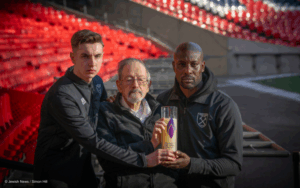Generations
 The murdered generation. The six million Jewish people murdered in the Holocaust, the non-Jewish people murdered because they were gay, disabled, Roma, Sinti or a member of another community targeted by the Nazis. We also learn and commemorate where persecution led in Cambodia, Rwanda, Bosnia and Darfur. The generation of people whose lives and voices were brutally taken away.
The murdered generation. The six million Jewish people murdered in the Holocaust, the non-Jewish people murdered because they were gay, disabled, Roma, Sinti or a member of another community targeted by the Nazis. We also learn and commemorate where persecution led in Cambodia, Rwanda, Bosnia and Darfur. The generation of people whose lives and voices were brutally taken away.
The first generation. Survivors themselves – those who lived through the Holocaust and other genocides in Cambodia, Rwanda, Bosnia and Darfur. A few, precious Holocaust survivors are with us still today. In addition, we can research the testimonies of those who survived the Holocaust and who died in the 1960s, 70s, 80s and more recently. This theme will encourage HMD organisers to research those who experienced and survived the Holocaust as adults but who passed away in the decades after the Holocaust.
The theme also includes the first-generation survivors of the more recent genocides, many of whom share their histories at HMD events each year.
The second and third generations. The children and grandchildren of survivors carry their legacy in a deeply personal way. For them, these stories are family history.
People today, of any generation, with no direct family link to the Holocaust or to recent genocides – many of whom will be organising and participating in Holocaust Memorial Day events around the country. Their role is just as vital. Through education, dialogue and a willingness to engage, we all inherit the responsibility of remembrance. Bridging Generations is about all of us. It’s about reaching across time and experience to keep memory and history alive and using them to shape a future that protects the dignity of every human being.